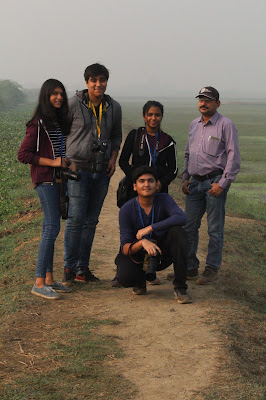When I floated a proposal to the photography club, Click, students of which I am a faculty advisor about visiting the Basai Wetlands, I was not sure if there would be a good response, a non-working Saturday, and the joy of getting up late, would I was sure, put a dampener on the whole proposal. My pitch to the students was that they had to make a difference to the society through their photography skills and with the possibility of the Basai Wetlands disappearing off the radar completely, thanks to the changes ushered by progress, it was likely that the photographs that they shot of migratory birds would remain virtual memories.
The challenge to the members to of the club was to become changemakers and not mute spectators watching the degradation of the environment. I wanted them to pick their equipment and take photographs of the flora and fauna supported by the Basai Wetlands. To my pleasant surprise, about ten students turned up early in the morning along with their fathers, and then we proceeded to the wetlands. I would not be wrong to state that they were pleasantly surprised to see a large number of Purple Swamphens, Teals, Cormorants, Ibis, Ducks, Egrets and Kingfishers. Some of them got down to work right at the beginning of the waterline, although I told them there was more ahead.
Ansh did not carry a zoom lens so I told him not to be disheartened as there was always a purple bird, (Me in the snap) that he could always photograph. I guess I will have to pay him a royalty for taking this snap, with my camera of course!
I had to get the Club card in focus and I did it! It was difficult getting them back because each step they took on the return, they saw something new to photograph, and I would not blame them for their reluctance to return home because there was so much to photograph. I am sure the reader would agree that the Basai Wetland is simply too precious as a Wetland because it is home to so many species of birds. This naturally occurring water body, one of the remaining water bodies in Gurgaon is under the threat of the axe of development! Unless the authorities do something to save this precious ecosystem, the birds that you see in this post will only be a memory of a trip we made one fine Saturday! I hope my students and members of the Photography Club, Click will do their best to spread awareness about the Basai Wetlands!
The scene of Ducks rising into the skies, amidst the background of greenery is only marred by the shells of buildings that I have seen in the same state for the past five or more years! It is a sorry thought that one day, instead of these green surroundings and the sight of ducks flying off into the horizon we will have only highrises shimmering in the heat haze with a cloud of dust hovering over them like an ominous portent that warns all mankind that when man advances, forests disappear, and when forests disappear, and grasslands disappear, then streams and wetlands disappear. When streams, wetlands, and forests disappear, then animals disappear. When animals disappear, then how far away can Man's time be before he too disappears!
And so I sing a song for these beautiful creatures,
That call out aloud of greater horizons,
Even as they swing into the sun,
Heed this song all ye who hear,
To save our wetlands and
Forests, we must rise on
The wings of greater good
And think of a better good
Than living inside concrete
Cages that breath in a fug of dust!
For better good, it would be, to fly Like
Thes magnificent birds, God's own Angels
That guide us towards better sense and mature thought!
If words could suffice to express the great joy and deep sense of connect that one has while visiting places where nature still exists in its pristine untrammelled state, then what need for photographs that reflect that amazing feeling? These are some of the snaps that I took in order to bring to the readers, the treasure trove we have in the Basai Wetlands!
But then it is not just about the birds, it is about the turtles, fish and amphibians living in the depths of the lake that sustain the birds. A couple of Ornithologists from SriLanka told me that it was a virtual paradise for them!
How to reach: You need to reach Pataudi Crossing, or Pataudi crossing, from the crossing, take the road that takes you to the Sultanpur Bird Sanctuary, this is the Gurgaon-Jajhar road. About two or three kilometres from the Pataudi Crossing you will come to a right bend in the road leading to a flyover. On your left is the Huda Water Processing Works. The Basai Wetland is on your right. Immediately after descending from the flyover, look for a narrow lane on the right-hand side of the road. You will have to take a right turn to enter a lane that seems to lead to nowhere. Take this track and drive on till you reach a sort clearing with a shed built on the right-hand side. You have arrived!












No comments:
Post a Comment